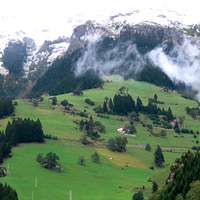Endangered language opens window on to past (w/ Video)

(PhysOrg.com) -- An endangered Greek dialect which is spoken in north-eastern Turkey has been identified by researchers as a "linguistic goldmine" because of its startling closeness to previous forms of the Greek language.
Fieldwork examining Romeyka, a little-studied form of Greek still spoken in the area around Trabzon, on Turkey's Black Sea coast, has revealed a number of features that it shares with the Koine (or common) Greek of Hellenistic and Roman times.
For linguists, the discovery presents a rare opportunity to map out the features not just of another living language, but of a dialect closer than anything else still living to that spoken at the height of Greek influence across Asia Minor, 2,000 years ago.
The link was (re)discovered by Dr. Ioanna Sitaridou, a lecturer in Romance Philology at the University of Cambridge and Fellow and Director of Studies in Linguistics at Queens' College, Cambridge. Her initial findings are reported in the University's research magazine, Research Horizons, and a short film about her research is also being released today.
"Although Romeyka can hardly be described as anything but a Modern Greek dialect, it preserves an impressive number of grammatical traits that add an Ancient Greek flavour to the dialect's structure - traits that have been completely lost from other Modern Greek varieties," Dr. Sitaridou said. "What these people are speaking is a variety of Greek far more archaic than other forms of Greek spoken today."
Until medieval times, the Black Sea lay at the heart of the Greek-speaking world. It was colonised by the Greeks in the 8th and 7th centuries BC and immortalised in Greek mythology.
Despite millennia of change in the surrounding area, people in the isolated region still speak the language. One reason is that Romeyka speakers are devout Muslims, and were therefore exempt from the large-scale population exchange between Greece and Turkey that took place under the Treaty of Lausanne in 1923.
Using religion as a defining criterion to resettle Christians in Greece and Muslims in Turkey, almost two million people were forced to move. The result was an obligatory exodus of all Christian Greek-speakers from north-eastern Turkey, leaving the speakers of Romeyka relatively isolated from both Turkish (albeit clearly not the case for the younger generations), but also sealed off from Pontic Greek spoken by the resettled Christians in Greece and elsewhere in the world.
Dr. Sitaridou, whose great-grandparents were from the region, is now reporting the results of the first phase of a project to uncover the secrets of this little-studied dialect.
She first became aware that Romeyka might be of special importance after Prof. Peter Mackridge, who is Emeritus Professor of Modern Greek at the University of Oxford and has carried out pioneering research since the 1980s, signalled to her that her work on Romance infinitives may have a parallel in Romeyka. Astonishingly enough, Romeyka had retained the infinitive - the basic, uninflected form of the verb. This was part of Ancient Greek, but has disappeared from the medieval and modern language. All the more astonishing, Romeyka has developed some other quirky infinitival constructions that have never been observed before - only in the Romance languages are there parallel constructions.
Her work involves undertaking field trips to villages in Pontus, often isolated enclaves where Romeyka is spoken, and mapping the grammatical structure and variation in use. Information is gathered using audio and video recordings of the villagers telling stories, as well as through specially-structured questionnaires using state-of-the-art modern linguistic theory.
Ultimately, the work seeks to explain how Pontic Greek evolved. "We know that Greek has been continuously spoken in Pontus since ancient times and can surmise that its geographic isolation from the rest of the Greek-speaking world is an important factor in why the language is as it is," said Dr. Sitaridou, recipient of a Stanley J. Seeger Visiting Research Fellowship in Hellenic Studies at Princeton University (Spring 2011).
"What we don't yet know is whether Romeyka emerged in exactly the same way as other Greek dialects, but later developed its own unique characteristics which just happen to resemble archaic Greek. On the other hand, it may have developed from an earlier version of Greek that was different to the rest of the Greek dialects, which in turn explains the archaic features."
Her latest report comes with a warning: Repeated waves of emigration from Trabzon, coupled with the influence of the dominant Turkish-speaking majority, have left the dialect vulnerable to extinction. UNESCO has already designated Pontic Greek as "definitely endangered".
"With as few as 5,000 speakers left in the area, before long Romeyka could be more of a heritage language than a living vernacular," Dr. Sitaridou added. "With its demise would go an unparalleled opportunity to unlock how the Greek language has evolved."
Provided by University of Cambridge












.jpg)








